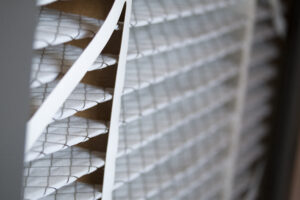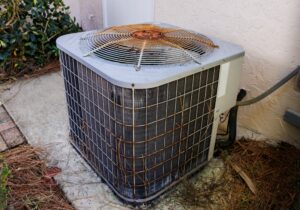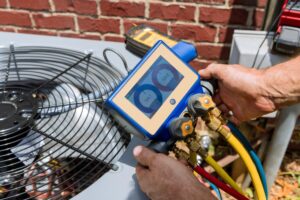In our day-to-day lives, we use items such as cleaning solutions, hair sprays, and candles that can create an unhealthy breathing environment. In the spring and fall, outdoor allergens can make it even worse for people who suffer from allergies, breathing problems, and dry/irritable skin. For these reasons, paying particular attention to indoor air quality (IAQ) can have life-enhancing results. Don’t suffer from airborne pollutants any longer; instead, learn about the most effective ways to improve indoor air quality.
Four HVAC Components That Will Improve Your Indoor Air Quality
Filtration
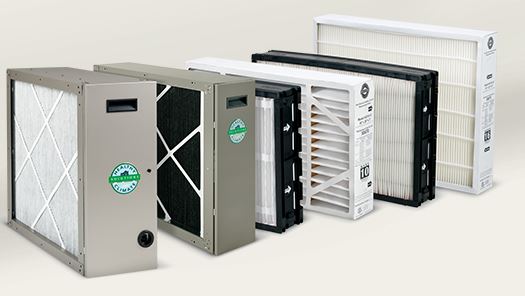
Filtration is a critical part of a home’s IAQ rating. H.J. Faust, Inc. recommends a 5″ pleated filtration system as a standard system. This is an improvement to most homes (1″ pleated filter), as it allows for better filtration and more surface space on the filter for air to flow through. This type of filter will ensure your HVAC system is running as efficiently as possible while circulating healthy air.
To truly purify your home’s air, ask your local HVAC technicians about the Lennox PureAir system. It is the best way to achieve hospital-grade filtration levels within your own home.
Filter Tip: A lot of the consumer-grade “High Allergen” filters can restrict airflow. This will result in your system working much harder to move air and will likely shorten the lifespan of system components. Consider installing an air purification system instead of using these filters.
Humidity
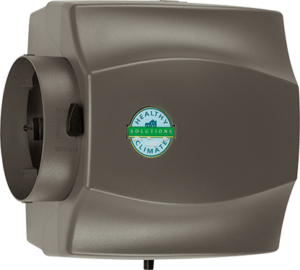
Humidity doesn’t just affect how dry or wet your home’s air feels; it also affects how warm or cold your space feels. Midwest winters can get brutally dry, and a whole-home humidifier is a great way to keep your indoor environment warm without drying out your skin and hair. The humidifier can also protect your wood floors, musical instruments, furniture, and artwork from the negative effects of dry air.
While dry air is no fun, excessive humidity in the spring and summer is also a problem. If you find that your air is too humid, you may be able to have your HVAC system configured to dehumidify, or it may be time to install a whole-home dehumidifier.
Call H.J. Faust to discuss how a whole-home humidifier can make your home more comfortable and healthy.
Humidity Tip: If you have condensation droplets forming on your windows, it may not be because your humidifier is set too high. Your fresh air intake may be insufficient, blocked, or non-existent. Fresh air is a critical part of controlling humidity and indoor air quality. Ask our expert technicians for help today.
Ventilation
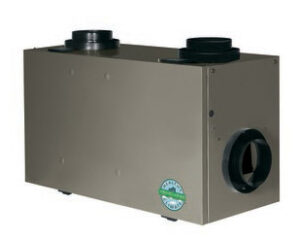
Ventilation starts with air balance. The air going into your home should balance with the air leaving your home. Without that balance, you can have a number of issues (poor humidification, stale air, chimney and exhaust issues, etc.). Once you have restored balance, you can use other ventilation products to make sure the air in your home stays fresh and clean. Ask us about our ventilation products and how they can re-circulate the air in your home with clean air when needed.
Ventilation Tip: Running a bath fan for a minimum of 45 minutes after a shower will help you reduce the impact of humidity on your home. Setting that fan on a timed switch ensures auto-shutoff.
System Control
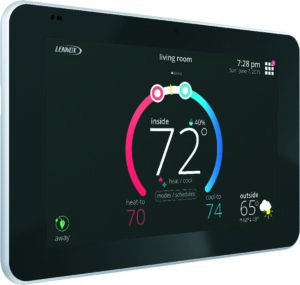
A smart thermostat may be the last thing you think of when you think of improving indoor air quality. However, all of the HVAC components that affect IAQ need to be controlled by a system that understands them. A smart thermostat can offer the ability to automatically control your heating and cooling system, air purification system, and humidifier components — all in an effort to improve air quality in the most efficient way possible. Call H.J. Faust, Inc. to discuss a smart thermostat that can elevate your home’s IAQ.
Control Tip: Some thermostats come with remote sensors that can be moved around the house to eliminate hot/cold spots. This is a great choice for a two-story home that only has one thermostat on the first floor.
Other Ways to Improve Indoor Air Quality
In addition to taking care of your home’s critical HVAC components (including its air filters, ventilation system, and thermostat), you can make changes to your everyday habits to achieve better indoor air quality in your home. Specifically, try to follow these recommendations:
1. Keep Your Home Clean
Regular cleaning can significantly reduce dust and animal dander, which are common triggers of indoor allergens and irritants. Use a vacuum cleaner equipped with a HEPA filter to capture these particles effectively, and then mop the floors after vacuuming to pick up the dust that was left behind. Also, consider using doormats and removing your shoes before entering the house to drastically reduce the amount of dirt and pollutants brought into your home.
2. Avoid Synthetic Fragrances
Many air fresheners, laundry products, and cleaners contain synthetic fragrances that can release harmful chemicals into the air. Opt for fragrance-free or naturally-scented products. Better yet, use natural products like baking soda and vinegar for cleaning, which don’t emit harmful chemicals.
3. Test for Radon
Radon is a colorless, odorless, radioactive gas that can enter your home through the ground and can be a significant health risk. Testing your home for radon is simple and inexpensive, and it is crucial for ensuring your home is safe.
4. Mindfully Select Household Products
Many household products, including cleaners, paints, and air fresheners, contain volatile organic compounds (VOCs) that can worsen indoor air quality. Opting for natural or low-VOC products can help minimize indoor air pollution.
Breathe Easier With the Help of H.J. Faust
For a more comprehensive approach to improving indoor air quality in your home, schedule a service with our experts at H.J. Faust, Inc. Our expertise in IAQ solutions can provide you with peace of mind, knowing your home’s air quality is in the hands of professionals. Whether you need routine maintenance or a more detailed air assessment, our team is here for you. Contact us today to get started!

